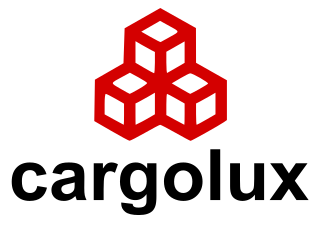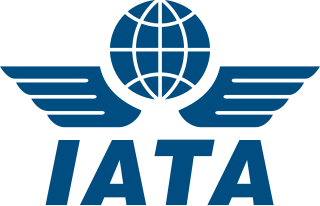Qantas Airways Limited is the flag carrier of Australia and the country's largest airline by fleet size, international flights, and international destinations. It is the second-oldest continuously operating airline, having been founded in November 1920; it began international passenger flights in May 1935. Qantas is an acronym of the airline's original name, Queensland and Northern Territory Aerial Services, as it originally served Queensland and the Northern Territory, and is popularly nicknamed "The Flying Kangaroo". Qantas is a founding member of the Oneworld airline alliance.

Price fixing is an anticompetitive agreement between participants on the same side in a market to buy or sell a product, service, or commodity only at a fixed price, or maintain the market conditions such that the price is maintained at a given level by controlling supply and demand.

Cargolux, legally Cargolux Airlines International S.A., is a Luxembourgish flag carrier cargo airline with its headquarters and hub at Luxembourg Airport. With a global network, it is among the largest scheduled all-cargo airlines in the world. Charter flights and third party maintenance are also operated. It has 85 offices in over 50 countries as of 2018, and operates a global trucking network to more than 250 destinations.
Collusion is a deceitful agreement or secret cooperation between two or more parties to limit open competition by deceiving, misleading or defrauding others of their legal right. Collusion is not always considered illegal. It can be used to attain objectives forbidden by law; for example, by defrauding or gaining an unfair market advantage. It is an agreement among firms or individuals to divide a market, set prices, limit production or limit opportunities. It can involve "unions, wage fixing, kickbacks, or misrepresenting the independence of the relationship between the colluding parties". In legal terms, all acts effected by collusion are considered void.

BlueScope Steel Limited is an Australian flat product steel producer that was spun-off from BHP Billiton in 2002.
Anti-competitive practices are business or government practices that prevent or reduce competition in a market. Antitrust laws ensure businesses do not engage in competitive practices that harm other, usually smaller, businesses or consumers. These laws are formed to promote healthy competition within a free market by limiting the abuse of monopoly power. Competition allows companies to compete in order for products and services to improve; promote innovation; and provide more choices for consumers. In order to obtain greater profits, some large enterprises take advantage of market power to hinder survival of new entrants. Anti-competitive behavior can undermine the efficiency and fairness of the market, leaving consumers with little choice to obtain a reasonable quality of service.
The Australian Competition and Consumer Commission (ACCC) is the chief competition regulator of the Government of Australia, located within the Department of the Treasury. It was established in 1995 with the amalgamation of the Australian Trade Practices Commission and the Prices Surveillance Authority to administer the Trade Practices Act 1974, which was renamed the Competition and Consumer Act 2010 on 1 January 2011. The ACCC's mandate is to protect consumer rights and business rights and obligations, to perform industry regulation and price monitoring, and to prevent illegal anti-competitive behaviour.
Singapore Airlines Cargo is the unit within Singapore Airlines (SIA) responsible for air cargo operations. It was incorporated in 1988. SIA Cargo manages the cargo operations of SIA's fleet of freight- and passenger aircraft. Its main office is on the fifth floor of the SATS Airfreight Terminal 5 at Singapore Changi Airport.

The Competition and Consumer Act 2010 (CCA) is an Act of the Parliament of Australia. Prior to 1 January 2011, it was known as the Trade Practices Act 1974 (TPA). The Act is the legislative vehicle for competition law in Australia, and seeks to promote competition, fair trading as well as providing protection for consumers. It is administered by the Australian Competition & Consumer Commission (ACCC) and also gives some rights for private action. Schedule 2 of the CCA sets out the Australian Consumer Law (ACL). The Federal Court of Australia has the jurisdiction to determine private and public complaints made in regard to contraventions of the Act.

Richard J. Pratt was an Australian businessman, chairman of the privately owned company Visy Industries, and a leading figure of Melbourne society. In the year before his death, Pratt was Australia's fourth-richest person, with a personal fortune valued at A$5.48 billion.
Qantas Freight is a subsidiary company of Australia's largest airline Qantas, responsible for the air cargo operations of the Qantas group. It is the owner of freight airline Express Freighters Australia, freight forwarder Qantas Courier and trucking company Jets Transport Express. Qantas Freight was also a partner in two joint ventures with Australia Post: Australian airExpress, specialising in door-to-door package delivery, and StarTrack, a road freight company. In November 2012 Qantas Freight fully acquired Australia air Express and divested its shareholding in Star Track to Australia Post. Qantas Freight was also the owner of Asian-based freight forwarder DPEXWorldwide until that company was acquired by its competitor Toll Holdings in 2010.
The Commerce Commission is a New Zealand government agency with responsibility for enforcing legislation that relates to competition in the country's markets, fair trading and consumer credit contracts, and regulatory responsibility for areas such as electricity and gas, telecommunications, dairy products and airports. It is an independent Crown entity established under the Commerce Act 1986. Although responsible to the Minister of Commerce and Consumer Affairs and the Minister of Broadcasting, Communications and Digital Media, the Commission is run independently from the government, and is intended to be an impartial promotor and enforcer of the law.
The Australian Consumer Laws (ACL), being Schedule 2 to the Competition and Consumer Act 2010, is uniform legislation for consumer protection, applying as a law of the Commonwealth of Australia and is incorporated into the law of each of Australia's states and territories. The law commenced on 1 January 2011, replacing 20 different consumer laws across the Commonwealth and the states and territories, although certain other Acts continue to be in force.
The Competition Commission of India (CCI) is the chief national competition regulator in India. It is a statutory body within the Ministry of Corporate Affairs and is responsible for enforcing the Competition Act, 2002 to promote competition and prevent activities that have an appreciable adverse effect on competition in India. The CCI looks into cases and investigates them if the same has a negative impact on competition.
Nurofen is a brand name range of pain-relief medication containing ibuprofen made by the British multinational Reckitt. Introduced in 1983, the Nurofen brand was acquired following Reckitt Benckiser's acquisition of Boots in 2005. The brand is primarily marketed and sold in the United Kingdom, other parts of Europe, South Africa, Australia and New Zealand. In 2016 it was the biggest selling branded over-the-counter medication sold in Great Britain, with sales of £116.8 million.
Drip pricing is a technique used by online retailers of goods and services whereby a headline price is advertised at the beginning of the purchase process, following which additional fees, taxes or charges, which may be unavoidable, are then incrementally disclosed or "dripped". The objective of drip pricing is to gain a consumer's interest in a misleadingly low headline price without the true final price being disclosed until the consumer has invested time and effort in the purchase process and made a decision to purchase. Naïve consumers will purchase based on headline price and sophisticated consumers will consider total cost when comparing offers. Drip pricing can distort competition because it can make it difficult for businesses with more transparent pricing practices to compete on a level playing field.

A2B Australia is an Australian public company which was listed on the Australian Securities Exchange in December 1999 and is an ASX 200 company. The company was founded by Reg Kermode. In 1976, the company established Cabcharge, an account payment system to provide a way to pay for taxi fares by non-cash means, which today is the sole provider of the in-taxi service.

ACCC v Cabcharge Australia Ltd is a 2010 decision of the Federal Court of Australia brought by the Australian Competition & Consumer Commission (ACCC) against Cabcharge. In June 2009, the ACCC began proceedings in the Federal Court against Cabcharge alleging that it had breached section 46 of the Commonwealth Trade Practices Act (TPA) by misusing its market power and entering into an agreement to substantially lessen competition. The action alleged predatory pricing by Cabcharge and centred on Cabcharge's conduct in refusing to deal with competing suppliers to allow Cabcharge payments to be processed through EFTPOS terminals provided by rival companies and supplying taxi meters and fare updates at below actual cost or at no cost.

The Competition Commission is the independent statutory body charged with regulating competition in Hong Kong. It was established under the Competition Ordinance, enacted in June 2012, which aims to prohibit conduct that prevents, restricts or distorts competition, and to prohibit mergers that substantially lessen competition in Hong Kong.








